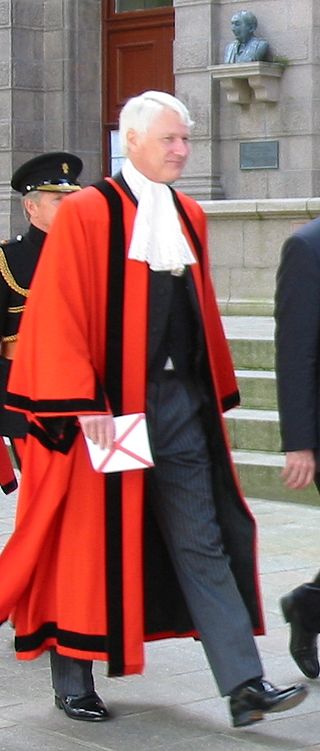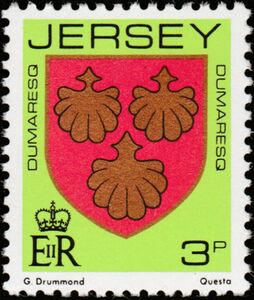
Jersey – the largest of the Channel Islands – has been an island for around 6,000 years. Early inhabitation is evidenced by various neolithic monuments and hoards. In the 10th century, Jersey became part of Normandy. When the Normans conquered England in the 11th century, Jersey remained a part of the Duchy of Normandy, but when Normandy and England were finally split in the 13th century, the Channel Islands remained loyal to the English Crown, splitting Jersey politically from mainland Normandy.
Philippe de Carteret II, 3rd Seigneur of Sark was the son of Philippe de Carteret I (1552–1594) and Rachel Paulett (1564–1650), daughter of George Paulett (1534–1621) who was Bailiff of Jersey from 1583 to 1611, and his wife Elizabeth Perrin (1538–1615).
Philippe de Carteret I, 2nd Seigneur of Sark (1552–1594) was the Seigneur of Sark and Saint Ouen from 1578 to 1594.
The Bailiff is the chief justice in each of the Channel Island bailiwicks of Guernsey and Jersey, also serving as president of the legislature and having ceremonial and executive functions. Each bailiwick has possessed its own bailiff since the islands were divided into two jurisdictions in the 13th century. The bailiffs and deputy bailiffs are appointed by the Crown on the advice of the Secretary of State for Justice and may hold office until retirement age.

The title Bailiff of Guernsey has been used since at least the 13th century and indicated the leading citizen of Guernsey.

The Bailiff of Jersey is the civic head of the Bailiwick of Jersey. In this role, he is not the head of government nor the head of state, but the chief justice of Jersey and presiding officer of Jersey's parliament, the States Assembly. The Bailiff is also the President of the Royal Court. It is similar in role to the Bailiff of Guernsey.

Sir Amias Paulet of Hinton St. George, Somerset, was an English diplomat, Governor of Jersey, and the gaoler for a period of Mary, Queen of Scots.

The lieutenant governor of Guernsey is the representative of the British monarch in the Bailiwick of Guernsey, a Crown dependency of the British Crown. The role of the lieutenant governor is to act as the de facto head of state in Guernsey and as liaison between the governments of Guernsey and the United Kingdom. The holder of this office is also ex officio a member of the States of Guernsey but may not vote and, by convention, speaks in the Chamber only on appointment and on departure from post. The duties are primarily diplomatic and ceremonial. He has the authority to appointment two members of the board of governors of Elizabeth College and the Priaulx Library.

William Paulet, 4th Marquess of Winchester was an English nobleman, the son of William Paulet, 3rd Marquess of Winchester and Anne or Agnes Howard. He was styled Lord St. John from 1576 to 1598. He was summoned to Parliament on 16 January 1581 in his father's barony as Lord St. John. On 24 November 1598, he succeeded his father as 4th Marquess of Winchester. Paulet experienced great financial difficulties arising from his magnificent style of living and his lavish entertainment of Elizabeth I at Basing House.

Sir Hugh Paulet of Hinton St George in Somerset, was an English military commander and Governor of Jersey.
Sir de Vic Graham Carey is a Guernsey bailiff. He is the son of advocate Victor Michael Graham de Vic ("Michael") Carey and Jean.
Sir Peter de Havilland was a lawyer and member of the de Havilland family of Guernsey. He served as Bailiff of Guernsey from 1810 to 1821.
George Paulet may refer to:

Elias Dumaresq, 5th Seigneur of Augres was born in 1674 and was a Seigneur of Augres located in the parish of Trinity, Jersey, the largest of the Channel Islands, He belonged to the influential Dumaresq family.

The Dumaresq family was a patrician family in the Channel Islands with a particularly strong presence in Jersey. The family would hold many offices and positions throughout the history of Jersey from the 13th century.

Elias Dumaresq, 3rd Seigneur of Augrès was born to Abraham Dumaresq, 2nd Seigneur of Augrès and Susan de Carteret daughter of Philippe de Carteret I, 2nd Seigneur of Sark and his wife Racheal Paulet. He was a Royalist and a Jurat of the Royal Court.
Abraham Dumaresq, 2nd Seigneur of Augres (1571-1631), held the manorial fief of Les Augrès, in the Island of Jersey and would be the first of the Des Augres branch of the Dumaresq Family.








